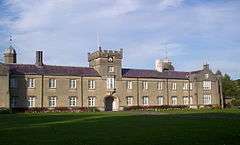Education in Wales
| Department for Education and Skills | |
|---|---|
| Cabinet Secretary for Education | Kirsty Williams |
| National education budget (2012–13) | |
| Budget | £1.854 billion |
| General details | |
| Primary languages | English, Welsh |
| System type | National |
| Compulsory education | 1997 |
| Literacy (2003[1]) | |
| Total | 99 % |
| Male | 99 % |
| Female | 99 % |
Education in Wales differs in certain respects from education elsewhere in the United Kingdom. For example, a significant minority of students all over Wales are educated either wholly or largely through the medium of Welsh: in 2008/09, 22 per cent of classes in maintained primary schools used Welsh as the sole or main medium of instruction.[2] Welsh medium education is available to all age groups through nurseries, schools, colleges and universities and in adult education; lessons in the language itself are compulsory for all pupils until the age of 16.
Since devolution, education policy in the four constituent countries of the UK has diverged: for example, England has pursued reforms based on diversity of school types and parental choice; Wales (and Scotland) remain more committed to the concept of the community-based comprehensive school. Systems of governance and regulation - the arrangements for planning, funding, quality-assuring and regulating learning, and for its local administration - are becoming increasingly differentiated across the four home countries.[3] Education researcher David Reynolds claims that policy in Wales is driven by a "producerist" paradigm emphasising collaboration between educational partners. He also alludes to lower funding in Welsh schools compared to England, echoing similar concerns at university level. He concludes that performance data do not suggest that Wales has improved more rapidly than England, although there are considerable difficulties in making these kinds of assessments.[4]
The structure of the Welsh educational system
Compulsory schooling
A child's age on 1 September determines the point of entry into the relevant stage of education. Education is compulsory beginning with the term following the child's fifth birthday, but may take place at either home or school. Most parents choosing to educate through school-based provision, however, enrol their children in the reception year in September of that school year, with most children thus beginning school at age four or four and a half. This is much earlier than in most other Western nations, reflecting a general trend towards less family time for UK children, and the subject of some debate as to its benefits.[5]
Primary education
In 2008/09 there were 1,478 primary schools in Wales with 258,314 pupils and 12,343 full-time equivalent (FTE) teachers. The teacher/pupil ratio was 1:20 and the average class size was 24.4 pupils.[6]
In 2008 a unique new curriculum - the Foundation phase - was rolled out to all schools in Wales. It began for 3- to 4-year-olds and by 2011 is in place for 3- to 7-year-olds. It is based on experiential learning, in small groups, with a teacher ratio of 1:8 for the youngest ages. It has been acclaimed as 'one of the most significant acts of the Welsh government since it was formed'. .
From Welsh government website:http://wales.gov.uk/topics/educationandskills/earlyyearshome/foundation_phase/?lang=en The Foundation Phase places great emphasis on children learning by doing. Young children will be given more opportunities to gain first hand experiences through play and active involvement rather than by completing exercises in books. They will be given time to develop their speaking and listening skills and to become confident in their reading and writing abilities.
Mathematics will be more practical so that children can see how problems are solved and how important mathematics is in their everyday lives. There will be more emphasis on children understanding how things work and on finding different ways to solve problems.
The curriculum will focus on experiential learning, active involvement and developing each child’s:
- Skills and understanding;
- Personal, social, emotional, physical and intellectual well being so as to develop the whole child;
- Positive attitudes to learning so that they enjoy it and want to continue;
- Self-esteem and self-confidence to experiment, investigate, learn new things and form new relationships;
- Creative, expressive and observational skills to encourage their development as individuals with different ways of responding to experiences;
- Activities in the outdoors where they have first-hand experience of solving real-life problems and learn about conservation and sustainability.
Secondary education
Pupils in secondary school take part in the compulsory GCSE and the non-compulsory A-level or BTEC qualifications at age 16 and 18 respectively. Since 2007 the Welsh Baccalaureate Qualification has also been available as an option although it was ungraded until 2014. In 2008/09 there were 223 secondary schools in Wales with 205,421 pupils and 12,535 FTE teachers. The pupil/teacher ratio was 16.4.[6]
GCSE and A-level GCE results for 2011.[7] At GCSE, 66.5% of Welsh domiciled students gained grades A* to C, compared with 69.8% in England. In 2014, At A-level, 75.4% of Welsh domiciled students gained grades A* to C, compared with 76.5% in England.[8] At A-level and BTEC, 23.9% of Welsh-based students gained A or Distinction grades, compared with 26.8% in England and the trend is consistent, with Wales have fallen back compared to England over the previous decade.
PISA results, by which the performance of Welsh pupils is compared to that of other countries, is also of enormous concern, with Wales lagging behind all other countries in the UK, leading to the then Minister of Education Leighton Andrews to describe the performance as "unacceptable".[9]
Education Consortia
There are four formal education consortia in Wales covering:
- North Wales (Flintshire, Conwy, Wrexham, Gwynedd, Isle of Anglesey, Denbighshire)
- South West and Mid Wales (Swansea, Neath Port Talbot, Carmarthenshire, Pembrokeshire, Powys, Ceredigion)
- Central South Wales (Bridgend, Cardiff, Merthyr Tydfil, Rhondda Cynon Taff, Vale of Glamorgan)
- South East Wales (Caerphilly, Monmouthshire, Newport, Blaenau Gwent, Torfaen)
Each of the consortia are responsible for school improvement services throughout their respective local authorities and schools. Whilst all aspects of school improvement are considered consortia roles, they are specifically targeted with addressing the three Ministerial priorities of; improving levels of literacy, numeracy and reducing the impact of poverty on education attainment.
Further education
Further education (FE) includes full- and part-time learning for people over compulsory school age, excluding higher education.[10] FE and publicly funded training in Wales is provided by 24 FE institutions and a range of public, private and voluntary sector training providers, such as the Workers' Educational Association. Colleges vary in size and mission, and include general FE, tertiary and specialist institutions, including one Roman Catholic Sixth Form College and a residential adult education college. Many colleges offer leisure learning and training programmes designed to meet the needs of business.[11][12] In 2008/09 there were 236,780 FE students in Wales.[6]
Adult community learning
Adult Community learning is a form of adult education or lifelong learning delivered and supported by local authorities in Wales.[13] Programmes can be formal or informal, non-accredited or accredited, and vocational, academic or leisure orientated.[14] In 2008/09 there were 57,170 learners in Community Learning.[6]
Higher education


Students normally enter higher education (HE) from 18 onwards. All undergraduate education is largely state-financed (with Welsh students contributing £1,255), and students are generally entitled to student loans for maintenance. The state does not control syllabi, but it does influence admission procedures and monitors standards through the Higher Education Funding Council for Wales.
The typical first degree offered at Welsh universities is the Bachelor's degree, typically taking three years to complete full-time. Some institutions offer an undergraduate master's degree as a first degree, typically lasting four years. During a first degree students are known as undergraduates. Some universities offer a vocationally based Foundation degree, typically two years in length.
Within Wales, medical undergraduate education is provided by only Cardiff University, while graduate fast track route training is provided at Swansea University. In recent years there has been an increase in the number of universities with their own degree awarding powers owing to the change in the University of Wales from a single awarding body for most of the Universities in Wales to a confederal structure, along with former institutes gaining university status. Overall there are 11 HE institutions in Wales including one music conservatoire, the Royal Welsh College of Music and Drama in Cardiff which is part of the University of Glamorgan Group. The University of Glamorgan, the second largest university in Wales, has never been a member of the University of Wales and awards its own degrees: the Royal Welsh College of Music and Drama also awards University of Glamorgan degrees.
In 2008/09 there were 146,465 enrolments at HE institutions in Wales, including 66,645 undergraduates and 23,260 postgraduates. Welsh HE institutions had a total of 8,840 academic staff.[6]
In 2012, the minister with responsibility for education within Wales, Leighton Andrews, made a significant statement in relation to the merger of Cardiff Metropolitan University (CMU, formerly UWIC), the University of Glamorgan and University of Wales, Newport (UWN),[15] in which he proposed the dissolution of CMU and UN as part of the process towards merger. However significant such changes may seem, it is arguable that the effective imposition of an average undergraduate fee of £7.5 K pa for the three institutions (and others, but not to Cardiff, Swansea, Bangor and Aberystwyth all of whom will charge £9 K pa) will cause much more substantial long term damage to these universities and reinvent the 'binary divide' between universities and the former polytechnics and HE institutes.[16]
See also
- List of education articles by country
- Treachery of the Blue Books
- Estyn
- Home education in the United Kingdom
References
- ↑ Estimate for the United Kingdom, from United Kingdom, CIA World Factbook
- ↑ "Schools in Wales: General Statistics 2009". Welsh Assembly Government. October 2009. Retrieved 13 February 2010.
- ↑ Raffe, D. and Byrne, D. (2005) Policy Learning From ‘Home International’ Comparisons. Centre for Educational Sociology briefing.
- ↑ Reynolds, D. (2008) "New Labour, Education and Wales: The Devolution Decade" inOxford Review of Education, v34 n6 p753-765 Dec 2008
- ↑ "BBC NEWS - UK - Education - Is five too soon to start school?". Retrieved 31 May 2015.
- 1 2 3 4 5 "Key Education Statistics Wales 2009". Welsh Assembly Government. December 2009. Retrieved 13 February 2010.
- ↑ "CEER Publications". Retrieved 31 May 2015.
- ↑ Smithers, Alan. "A levels 1951-2014" (PDF). Centre for Education and Employment Research, University of Buckingham. p. 16. Retrieved 17 October 2015.
- ↑ "Pisa tests show pupils in Wales falling behind". BBC News. Retrieved 31 May 2015.
- ↑ Education Act 1996, Part 1, Chapter 1, Paragraph 2
- ↑ Welcome to fforwm Archived February 28, 2009, at the Wayback Machine.
- ↑ "National Training Federation Wales". Retrieved 31 May 2015.
- ↑ Introducing Community Learning Wales
- ↑ Delivering Skills that Work for Wales: A new approach to Adult Community Learning. Consultation document issued 29 September 2008
- ↑ "Cardiff Metropolitan University included in merger plan". BBC News. Retrieved 31 May 2015.
- ↑ "Welsh university fees set to fall after Hefcw decision to reallocate spaces". walesonline. 11 April 2012. Retrieved 31 May 2015.
External links
- Royal Commission on the Ancient and Historical Monuments of Wales in English and Welsh
- Welsh FE Colleges